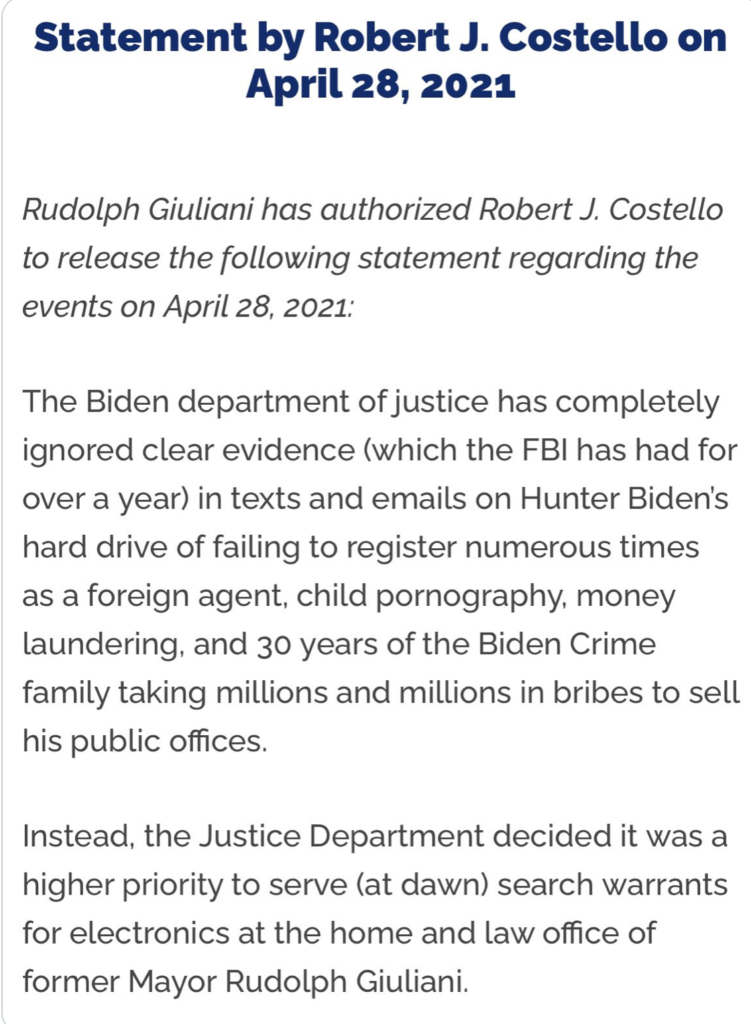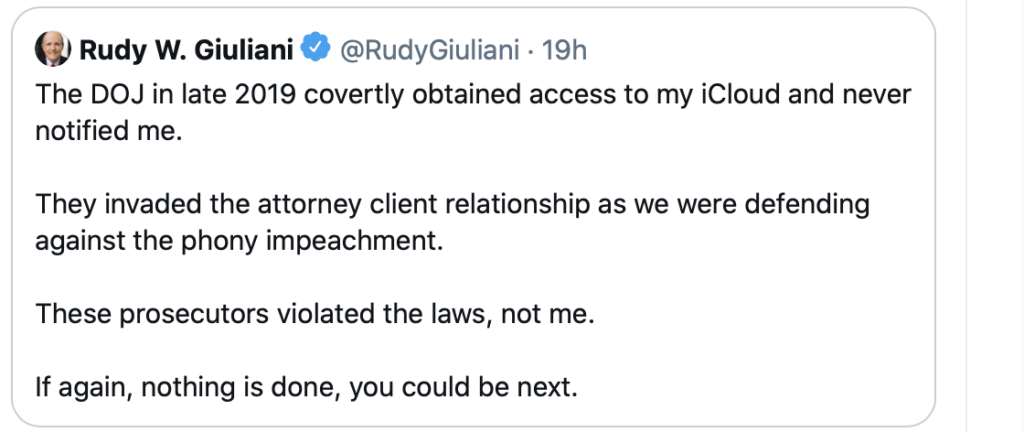If you’re like my followers on Twitter, you’re curious about the Rudy Giuliani search warrant.
What the search of Giuliani’s premises tells us is that the prosecutors had probable cause to believe that a crime was committed and that the search they wanted to do would turn up evidence of that crime. To get a search warrant, the prosecutor makes such a showing to a judge, who then signs off on the warrant. The bar is higher for searching a lawyer’s office because of attorney-client privilege. The catch is that attorney-client privilege doesn’t cover crimes, but because of the sensitivity of material being search, the judge and prosecutor will take extra care to make sure that the evidence justifies the warrant. Moreover, because Giuliani was a politically prominent person representing the President of the United States, it was even more important that the evidence supported the search.
All that means is that the prosecutors were quite sure a crime was committed and that the search would turn up evidence.
Guiliani had this to say:
Even if what he says about Hunter Biden was true, “someone did worse,” is not a defense to a crime. “I’m being prosecuted for political reasons,” is also not a defense. Giuliani knows that these are not actual legal defenses. He’s playing to the Court of Right-Wing Opinion.
Next, apparently, Giuliani learned that he had also been searched in 2019. We learned because he spilled his panic and fury on Twitter:
Giuliani, a former prosecutor who (ironically) was in favor of giving law enforcement broader authority to search people, well knows that prosecutors don’t “notify” people that they executed a search warrant. Also notice the date: The search occurred while Trump was president.
I like the part about the “phony impeachment.” As we all remember, Giuliani was working with the corrupt Lutsenko who was spreading lies about Hunter Biden. Then when Lutsenko lost the election and Zelensky became president of Ukraine, Giuliani and Trump tried to strong-arm Zelensky into launching an investigation of Hunter Biden in exchange for the aid that Congress designated for Ukraine.
One theory of the current developing case against Giuliani is that Giuliani offered to get rid of Ambassador Yovanovich, who was trying to crack down on corruption in Ukraine, if (1) the corrupt Ukrainians who wanted her gone paid money to Giuliani and (2) helped Trump by investigating the Bidens.
This is in addition to the shenanigans that were the subject of the first impeachment.
This is what we know. There is lots we don’t know.
Seems to me if he had a pardon, he’d use it to try to shut down the investigation. Why let an investigation keep turning up embarrassing stuff if he has a way to shut it down. Also, just judging from the level of his panic, I’d say he doesn’t.
However, given the fact that Giuliani obviously has criminal liability, it’s easy to see why he was so desperate to keep Trump in power. Most federal crimes have a statute of limitations of 5 years. If Barr could have kept the investigation shut down for another 4 years, the statute would have run. So he thought keeping Trump in power would keep him above the law. Oops.
Q: I was just reading your posts about R. Giuliani’s odd statement. In it we again see claims of Biden being this or that horrible thing. Why does Biden or others attacked in this way not take it to the courts for slander/defamation.
A few people have asked me this. They definitely have grounds for a defamation lawsuit, but my guess is that they want to be dignified and rise above the fray. The problem with defamation is that they have to prove that Hunter was damaged by the lies. They probably prefer to adopt the attitude that, “Those lies are so absurd nobody would really believe it.” Also, it’s possible that some of this criminal conduct had to do with framing an innocent person. In other words, if the truth comes out, they may not need to sue for defamation. The liars will get worse: Criminal liability.
This next question was in response to this post about fascist liars. (The questions in blue type are the ones that come to me through email).
So, how do these liars find whatever is expedient for their benefit in order to give up lying? In other words, create the higher truth is impossible for realists like me to even follow the danged logic in this Qanon world of jibberish. Sorry. I don’t know how to play the game. My mom taught me that I’d be punished more for not telling the truth than I would be for the deed itself. I guess I believed her.
It also befuddle me. I’m always afraid of making an error in my tweets or on my blog. It’s hard to imagine people telling what they consider “ideological” lies, or lying for a higher good.
Do you feel that Judge Cahill’s remark that Maxine Waters’ remarks may cause the Chauvin conviction to be overturned on appeal is accurate? If so, does that set a precedent for any high profile defendant convicted to make the same argument?
A few people also asked me this. Judge Cahill didn’t actually say it may cause the conviction to be overturned on appeal. The judge said this would be grounds for appeal. There is a big difference. To bring an appeal, an issue must be non-frivolous. This is a very low bar. To win an appeal is a much higher bar, and the reality is that most appeals lose. In California, for example, the chances of winning on appeal are less than 20%, and this includes “wins” that don’t actually help the client. For example, you might “win” the chance to have a second trial. Then, likely, you get the same result. Very few guilty verdicts are overturned on appeal.
I know about this. I had an appellate practice for 12 years representing indigents appealing from adverse rulings. Because the client had a constitutional right to legal representation (Sixth Amendment) I had a duty to bring any appealable issues I could find. Occasionally I couldn’t find any. If there were no appealable issues, I had to file a motion with the court and it was approved by an independent, non-profit law firm. This was to make sure that any issues that could be brought were brought.
One reason so many appeals lose is because of a doctrine known as Harmless Error. It’s not enough to show that a court or prosecutor (or someone) made an error. Errors happen all the time. To overturn a conviction, the appellant must show that the error was harmful and that it was likely (or did) change the outcome.
It’s a good thing that defendants in criminal trials can raise any possible issues. The appellate process serves as a safeguard against mistakes so that we can make sure that innocent people are not convicted. This doesn’t mean they will win. In fact, they lose most of the time.










